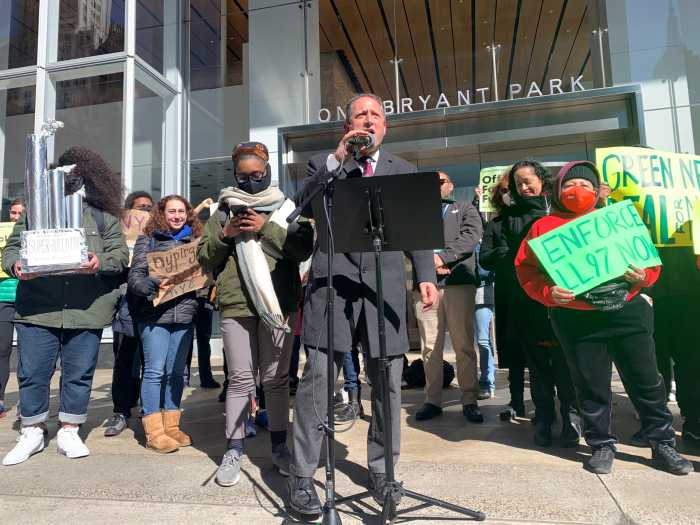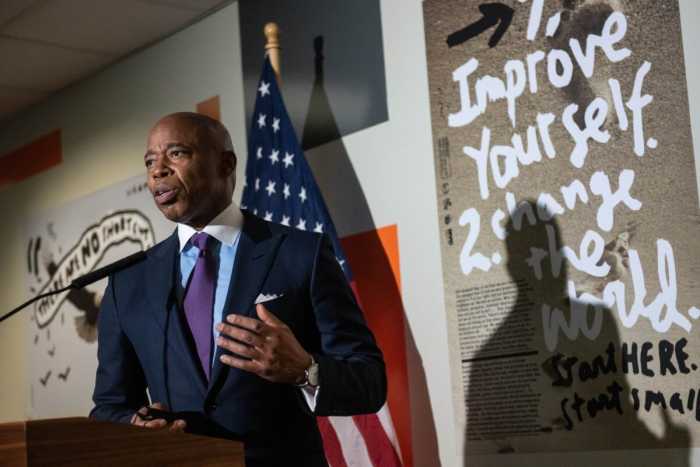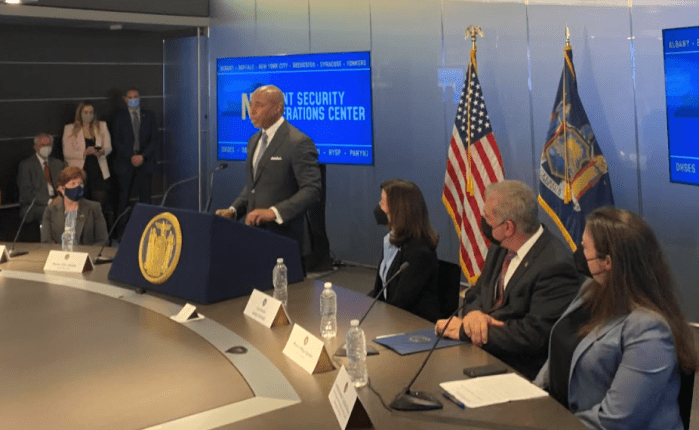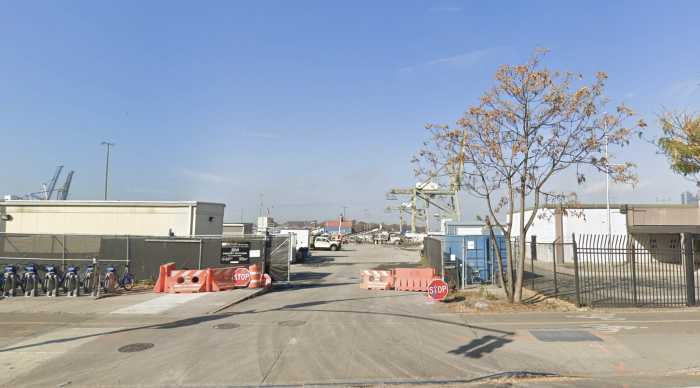As Mayor Eric Adams rallied with union leaders Monday morning calling on Albany lawmakers to grant him four more years of control over the city’s public schools, the United Federation of Teachers (UFT) – the city’s largest teacher’s union – was nowhere to be seen.
The mayor was joined by city Department of Education Chancellor David Banks and leaders from public sector unions including 32BJ SEIU and DC37.
Adams hedged in his response to a reporter’s question about why the UFT didn’t have any representatives at the rally, telling reporters they should direct the question to UFT President Michael Mulgrew. But, Adams said, the unions that were present are largely representative of public school employees and parents.
“Michael represents the UFT and I believe that I’ll allow union leadership to speak on behalf of their membership,” Adams said. “I think that these unions that are here are part of, you know, the thousands of parents as well as employees. And so I think that having a combination of all of our unions are important in this initiative. One thing’s for sure, everyone agrees the more clarity that we have, the better we’re going to be to resolve the problems in our school system.”
In a statement to PoliticsNY, a spokesperson for the UFT responded that the union supports mayoral control but only if public school parents get a greater voice in how the system is run.
“While we support mayoral control, we have also repeatedly called for more checks and balances and greater parental voice,” the spokesperson said.
Mayoral control, which has been in place since 2002 when it was won by former Mayor Michael Bloomberg, gives the city’s mayor almost total authority over the public school system by allowing them to pick the schools channeler and nine members of the 15-member oversight body known as the Panel for Education Policy (PEP). The policy has been renewed by Albany lawmakers every couple of years for the past two decades.
When he unveiled his executive budget last month, and again Monday, Adams said the continuation of mayoral control is essential to accomplishing his education goals. And that he and Banks, both public school graduates, should be trusted to run the system.
“The Chancellor and I have laid out a bold new vision for our children and for the families that attend our public school system,” Adams said Monday. “And this is the first time in history where we have two men who grew up in the public school system with two different experiences. One dealing with a learning disability, another dealing with a Gifted and Talented program. And I say this over and over again, as I stated at my State of the City address, ‘I mean, we had two guys [who were] Boston fans, why can’t we have a Mets and Yankees fan run our school system?’ We grew up in this system and we know what’s needed.”
Proponents of mayoral control, including Adams and Banks, argue the policy is necessary because the system was corrupt and mismanaged when it was run by the Board of Education and local school boards.
“I remember the system the way it was, and it was a system that was wrought with political corruption,” Banks said. “It is the reason why we went to mayoral accountability. The old system did not work. And if we did not grant mayoral control, we would be going back to a system that does not function well.”
A final decision has to be made on extending mayoral control, which sunsets at the end of June, before the legislative session ends June 2.
In the UFT’s public statement of legislative priorities it puts out each year, the union called for renewing mayoral control only if specific changes are made to the PEP. These include taking away two appointments from the mayor and giving them to parent members approved by the Community Education Councils (CECs) presidents, installing one-year term-limits and maintaining a sunset provision.
The mayor however said he doesn’t support significant restructuring of the PEP because it’s central to the policy of mayoral control.
“You lose the PEP, you lose mayoral accountability,” Adams said. “You know, we want to be held accountable. We want people to point to us if things fail. We will turn around our school system and PEP is part of that.”
However, Assembly Member Michael Benedetto (D – Bronx) – who chairs the lower chamber’s Committee on Education – said Adams will likely have to deal with at least some changes to the PEP’s structure.
“I can’t really say which way the conference is going to go right now,” Benedetto said. “I can say that if we continue mayoral control, there will be changes. What those changes are and how extensive they will be, that I don’t know.”
Benedetto said his committee discussed mayoral control last week but hasn’t made any final decisions yet. They’ll hold more conversations over the next couple of days to hammer out a decision that’ll then be presented to the whole Assembly, he added.
Adams said other proposals like increased term-limits for PEP members are all a part of the conversations he plans to have with Albany lawmakers in the coming weeks. But when those conversations will actually happen is unclear as the Adams canceled his scheduled trip to push for mayoral control in Albany this week and wasn’t clear about when it would be rescheduled for.
“I wanted to get up as soon as possible,” Adams said. “My Intergovernmental Affairs team is finding out the best time to align my schedule with the men and women lawmakers in Albany so we can get the best bang for our buck. And so it’s just about scheduling, you know. We would love to get up there as soon as possible. But we have been on the phone. As I stated, I spoke with the leaders of both the Assembly and the Senate. So we would like to get there as soon as possible because this is an important issue for us.”










